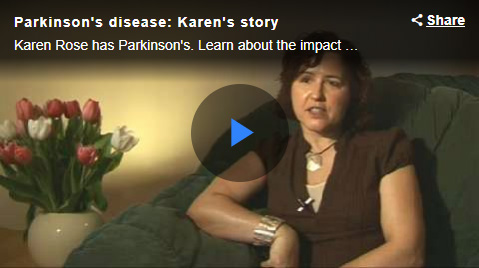Parkinson’s disease is a condition in which parts of the brain become slowly damaged over many years. More information about common symptoms, how it is diagnosed and what treatments are used can be found on the NHS Inform website
In the disease, special brain cells that make a chemical called dopamine begin to die. Dopamine is important in helping send messages between some brain cells. Less dopamine makes it more difficult for parts of the brain to work well and this leads to different symptoms that the person may notice.
The three main symptoms of Parkinson’s disease are:
- involuntary shaking of particular parts of the body (tremor)
- slow movement
- stiff and inflexible muscles
A person with Parkinson’s disease can also experience a wide range of other physical and psychological symptoms, including:
- depression and anxiety
- balance problems – this may increase the chance of a fall
- loss of sense of smell (anosmia)
- problems sleeping (insomnia)
- memory problems
This video describes what it was like for a young person to discover they were living with Parkinson’s disease.
Most patients who attend are our clinics are older (usually in their 60’s or 70’s). Deciding whether a person has Parkinson’s disease can take some time, and often people attend the clinic two or three times over many months before their doctor can say for sure.
Some people are referred to our clinic with conditions that are not Parkinson’s disease and are not serious. They may only need to be seen in clinic once. Other people are seen again over many years.
As well as Parkinson’s disease, there are other conditions that affect the same part of the brain and are also looked after by our specialist team. These include:
Dementia with Lewy Bodies is a disease that more affects people’s memory. While the Parkinson’s services can be involved in looking after people with this, in the long term it is more commonly looked after by teams working in psychiatry.
















